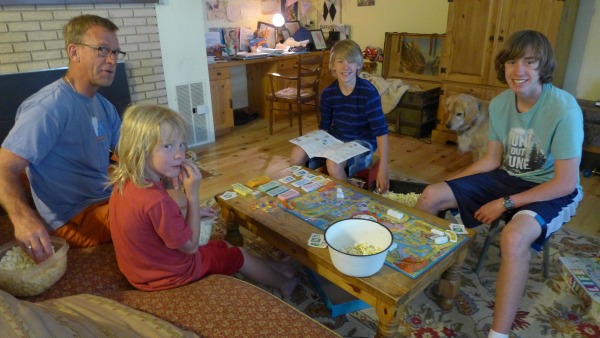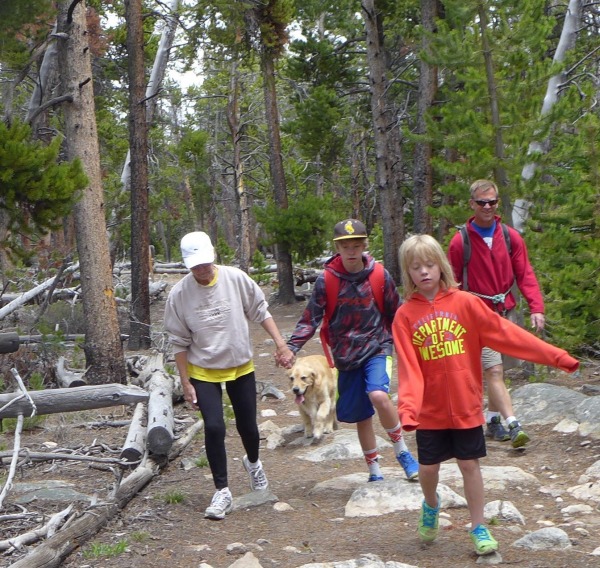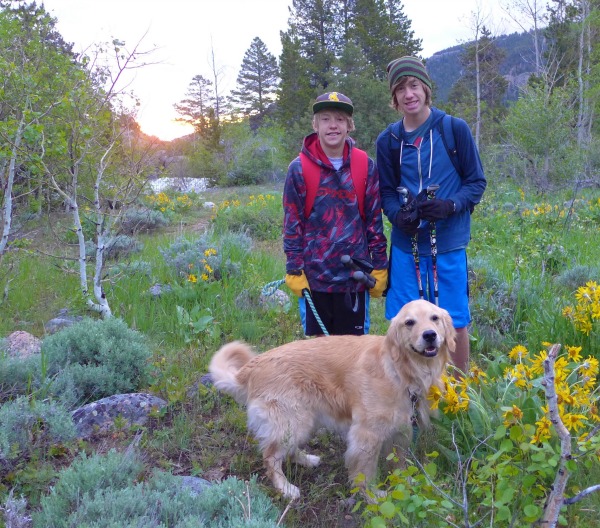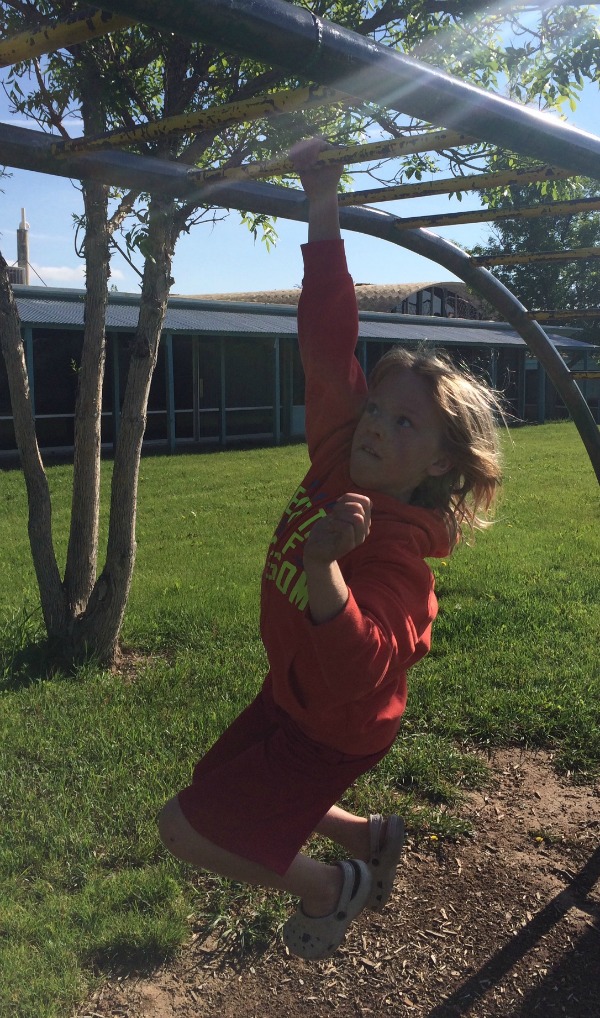Whew! We Survived the Epic Wellness Challenge Week
June 11th, 2015
Whew! We made it to the other side. If you read my last post, my family and I embarked on what I am calling a 7-Day Epic Wellness Challenge. (Read the pre-challenge post and see the pre-challenge video interviews.)
In short, we agreed to give up a lot. We basically gave up technology, auto transportation, and processed foods for a week. (At the outset, a friend suggested we were going Amish, and that description would be pretty apt.)
I’m excited to report here about both the challenges and the takeaways from our experience.This blog post is lengthy, and I apologize for that. But it was a long week, after all! (We also recorded a video with post-challenge insights from each of us, which you’ll find at the end of this post. I hope you’ll watch it, but I also hope you’ll read this post because there are more insights that we discovered after we recorded the video, and they’re significant, and unfortunately, not included in the video.)
Many have asked me what inspired this challenge. That’s a good question. Four things inspired it:
1–I’m a health enthusiast and wellness coach and presenter. I am always experimenting with ways of eating, ways of exercising, and most importantly, ways of living. I’m a huge fan of the Blue Zones work being done by Dan Buettner. I love my life and I want to live as long as I can, as vitally as I can. I know that life expectancy for me is 78.7 years. I also know that the many healthy habits I’ve adopted over the course of the last six years increase my expectancy to 91. Barring cancer or other disease or tragedy, that’s 32 years more years of life if I live the typical American woman’s life, or 44 years if I continue to make some sacrifices and live a more disciplined life. If I’m lucky and I do live to be 91, that’s only 16,000 days I have left. And, as far as I’m concerned, that’s not enough. So, I’m fascinated by aging in a way that extends and improves my life. It just so happens that my family is the most important thing in my life, so their health is even more important than mine. I wanted to see if our giving up technology, auto transportation and processed foods for a week would translate into more vitality.
2–I love challenges. I like committing to things that are difficult – so difficult that the outcome is uncertain. This week of deprivations fit the bill for being difficult. I know – my poor family! Friends and colleagues have asked me, “How did you get your family to go along with this?” Here’s how: I asked them, while explaining how much I wanted to do it, and they said Yes. (I know how lucky I am to have them willing to get on board – and how unlucky they were!)
3–My curiosity. I love to learn and discover new things. I was curious about how embarking on a challenge like this together might affect our family. I was inspired to make new discoveries with the people I love the most.
4–My desire for us to return to the ways of my childhood, if even only for most of the time and not all of the time. When I was a kid, I biked everywhere, with friends, and to friends’ houses. I played outside all of the time, and in creative ways. Jerry has the same memories of his childhood. He remembers being turned loose and playing ‘til the sun went down. Ours are fond memories and reflective of a healthy life, and we want our boys to experience similar times, especially during the summer when school is out and the weather is nice.
LIMITED TECHNOLOGY:
During the 7-day period, we gave up all television, movies, video games, and even listening to music and podcasts on devices. We gave up all social media, including Facebook, Instagram, etc. Our two oldest sons gave up their cell phones. Jerry used his only for family correspondence, and I used mine only on weekdays and only for coaching and other work-related calls. I gave up my cell phone completely for the weekend. In fact, to ensure I wouldn’t goof up, I turned my phone off and locked it in the trunk of my car Friday evening.
Here’s what happened: We played a lot together. We played many games – a different game every evening. One night we had a pool tournament followed by a ping pong tournament. The next night we had a heated game of Aggravation. The next night we played Life. Another night we played Apples to Apples. I loved games before, and we’re a game-playing family. One of the reasons I love playing games with my family, or with anyone for that matter, is it is FUN. Most games generate spontaneous interaction, and “play” happens. Our connections with each other are deepened. Or, in more personal games, where there are just two of you, conversation is facilitated that just wouldn’t occur if you were watching a movie together.
We went on family hikes. We saw my parents more. We biked a lot. We biked all over town and to parks and playgrounds. Once we biked to a playground, where we played basketball and messed around on the monkey bars and swings.
We all read more. I re-read a favorite, Gift From the Sea, a new book by Eric Greitens called Resilience, and I started reading Wanderlust: The History of Walking, by Rebecca Solnit. Jerry and the boys read more than usual, too.
What what hard about it: I would be lying if I didn’t say the lack of technology was challenging for each and all of us. Every night during dinner we’d each share what was most difficult about the day. For example, my husband, Jerry, missed watching the news on television every morning. He gets up early every day and catching the news on TV while drinking his coffee and reading the newspaper are a morning ritual for him. He missed this.
I missed Facebook. I love Facebook and missed checking in on a regular basis to see what friends and colleagues and relatives were up to. I have a dear friend who is traveling with her family in Africa right now, and I missed being able to see their photos and posts. One night I wanted Kimchi, and I wondered where in our small town I could find that. Normally I would post a quick question to Facebook, and within minutes would have 10 responses from local friends. Another time, I talked our two oldest sons into getting up before sunrise and hiking with me. I captured a wonderful photo of them with our dog in flowers with the sun rising in the background. I would have loved to have shared that photo in real time, (and hopefully inspire others to get up and hike our trails at sunrise.)
Wolf, 15, and Hayden, 13, most missed their cell phones and the quick access to their friends. Our youngest son, Fin, 8, missed morning cartoons. All three of our sons missed having what we call “privileges” on Friday and Saturday nights – a chance to play some video games and watch a rented movie together.
Not texting was hard for me, too, and I goofed early on. One of our son’s friends left a note on our door asking if he could get his work gloves back, which he had left in my car the previous day. I quickly (automatically) texted his mom and indicated we put them in our mailbox for them to fetch the next day. And there was one other similar goof-up by me on this front. They were not intentional, and I am reporting that I quickly course-corrected myself.
We all missed listening to music. That was hard during trips to the trailhead, on my work trip to and from Dubois, for the boys when playing in the Lego Room, and for all of us during times when we were just hanging out at home or in the backyard, which was often! However I have a vivid memory of Day 3 when Jerry and Fin were playing ping pong out back and I was shooting hoops with Hayden, and beautiful piano music was being played by Wolf and filling our back yard through the screen door. That was an amazing memory!
Takeaways:
–Without our gadgets and various technology privileges, we were together more. There’s just no other way to explain it. Sherry Turkle’s Alone Together is a book I recommend. I read it a couple of years ago but was reminded of it during this challenge. In the book, Turkle examines the current landscape – one where we all have our gadgets and instant connection to our friends and networks that are in another physical place. Being together more often meant being together-together rather than alone-together. We had to work harder to be together. There was definitely more arguing and nagging than normal, which was at times frustrating for all of us, and certainly required effort. We had to work harder at co-existing.
–The upside to being together more, and even to arguing more as a result, is that we bonded at a deeper level over the 7 days. I can say that by the end of each day, I had had numerous meaningful conversations with each of our sons, and with my husband. This is significant, because my best (epic) life is one where I have meaningful connections on a regular basis with my loved ones.
–For the weekend, I locked my phone in the car. And it’s a good thing I did because I counted 30 times that I passed by the area where my phone is usually plugged in, to “check” my phone. This was telling, if not surprising. I’m a little too tethered to my cell phone. I will likely go many weekends from here on out with my phone locked in the car. 🙂 I actually go unplugged often. All of my wilderness expeditions are unplugged, and often when on a road trip in Wyoming there is no reliable cell signal. As much as I love my technology, I LOVE being free from it. But despite knowing I love to be untethered when it comes to my cell phone, I also love to be tethered. I will continue to work on this and be more conscious about the time I invest using technology.
(BTW, if you want to break a habit, or stop doing something, I highly recommend you “remove” it from your environment. Ask yourself, are you practicing saying No to something, or are you practicing living a better way that does not include that thing? They are not the same thing, and I can tell you the former is more difficult. You have a better chance at success by removing the thing from your environment.)
–There are tricks to help make restrictions easier. Since I was still using my cell phone for work on week days, it was even harder to ignore Facebook and Instagram because the apps were right there at my fingertips. Anticipating that ignoring social media would be hard, I moved these apps from my home screen to a screen at the very back, making it unlikely for me to stumble upon them. I also turned off notifications for Facebook, Instagram, and Messaging. This is a tip I often promote in presentations and in my leadership development work. But before this challenge, I wasn’t following my own advice. Doing this was a brilliant way to not be alerted by comments or posts or messages in my social network. (This helped tremendously, especially when you consider that when I finally checked Facebook this morning, after 7 days away from it, I had 92 notifications, 11 new friend requests and 8 unread Facebook messages!) Not having the little red circle with the number of new notifications next to the Facebook app on my home screen helped me achieve my goal.
–The boys biked or walked to friends’ houses. What a concept, right?! This is how Jerry and I did it when we were our sons’ ages, but boy, how times have changed. This rarely happens – especially without prior arrangements made via a cell phone.
–I saved the most significant takeaway for this category for last: Without our technological gadgets and distractions, time passed more slowly. Our family talked about this at dinner on Night 7, and everyone agreed that during the seven days, the days were longer, and that this was a positive.
My husband put it this way: “We had to be there, in real time, together, and somehow that made time pass more slowly. We weren’t zoning out watching a movie or looking at our phone and then suddenly wondering where the time went.”
Seneca said “Life is long enough if you know how to use it.” We have learned that our time is longer without gadgets, or at least with some strictly-enforced rules and boundaries around gadgets.”
NO CARS:
For the 7-day period, we were not allowed to use our cars for any transportation, except to travel to a trailhead, or for my half-day work trip to Dubois, WY, on Tuesday. We had to bike and walk everywhere.
Here’s what happened: We are already an active family. For months now, I’ve been deliberately walking to places more often, and during the summer it’s typical for us to have our kids biking and walking to places. But still, this was harder than anticipated.
We walked, and biked A LOT. My FitBit reports I walked 175,000 steps (about 70 miles!) in 7 days. That does include a training hike and a family hike, but still, that’s a lot of steps, and the stat is reflective of our family walking so many places. BTW, I gained some useful information: I now know that it’s 3,000 steps, roundtrip, to our local grocery market. It’s 2,000 steps roundtrip to my parents’ house. It’s 5,000 roundtrip steps to the Oxbow, where Rotary meets on Wednesdays. It’s 2,000 pedal revolutions (if you ride a coaster bike and take the out-of-the way, scenic route, to the print shop to ship my package via UPS. It’s 3,000 roundtrip steps to the elementary school playground. And so on.)
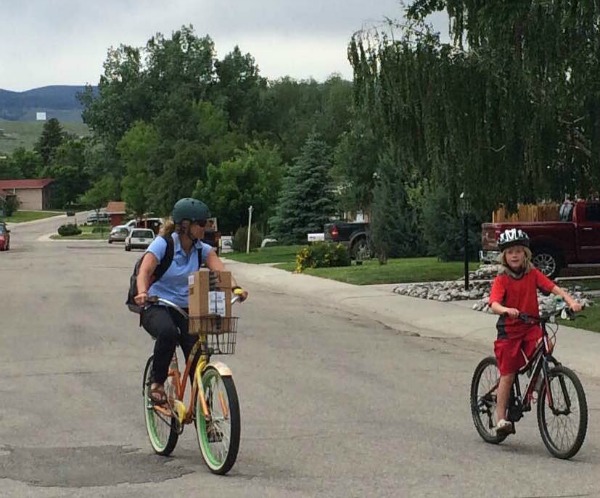
Fin and I. Notice I have a backpack on for groceries we were about to fetch, and a package we would deliver to UPS.
A particularly special positive: our boys rode their bikes to my parents’ (their mommom and poppop’s) house more frequently. We spend a lot of time with my parents, but our boys spending more time over there on their own was neat, and it was a highlight for them.
Did I mention I love Lander, Wyoming? Ours is an awesome community that is a small town where one can walk or bike everywhere.
As far as I know, there isn’t a study that reports that sitting is inspiring or that sitting makes us more creative or healthy. There are, however, countless studies that indicate walking is inspiring and makes us more creative and energized. As Americans, we sit an average of 9.3 hours a day. And when we sit this much, we’re more likely to get particular diseases and cancers, and it’s no wonder we’re not feeling more inspired. (BTW, gym rats are not off the hook. You can be fit but not healthy. I think not too long ago I was a case in point. Even though I hike 1,000 miles a year, and train hard 3-4 times a week, I was quite sedentary each day. I bought a FitBit 18 months ago. Now I average 10,000-20,000 steps a day. This increased mobility throughout my day is just about 100% due to my FitBit and the fact it makes me more conscious about my level of activity each day.)
“Walking, ideally, is a state in which the mind, the body, and the world are aligned, as though they were three characters finally in conversation together, three notes suddenly making a chord. Walking allows us to be in our bodies and in the world without being made busy by them.” – Rebecca Solnit, Wanderlust: A History of Walking.
What was hard about it: Sometimes we were just tired of moving.. (On one day of our challenge, we walked three times to the market, in addition to going on a family hike in the mountains)
One day – the same day I had gone on a hard training hike – I walked to the grocery store, to the hardware store, and then remembered I had a package to ship. Normally it would take about 8 minutes, total, to drive the package to UPS and return. It took me almost 30 minutes on my bike to run the same errand. I was tired that day from my time on my feet and it was hard to muster the motivation to bike that package up and not wait for Thursday to come when I could drive it!
One night we had dinner on the table and realized we were missing a key condiment. Was it worth walking or biking to the market? We voted No. But if we could have driven there, we would have definitely opted to go and get it.
On Night 7, Wolf had to get to a haircut, and walked in pouring rain and thunder with an umbrella and rain jacket on to and from. Normally we’d give him a ride.
Takeaways:
–Here’s our biggest takeaway for this category: When we don’t use cars, we sleep better at night. By the end of each day, we were tired! We were already an active family. But take away the cars completely, and we reached a new level of active. (My FitBit also tracks my sleep, and except for one night when someone, who I will not name, did some unusually raucous snoring, my FitBit indicates my sleeping was improved for the week.)
Before you start yawning… Sleeping better is kind of a big deal. Hopefully you’ve been reading the latest news about sleep science. Some of the smartest, healthiest people I know are now calling sleep the #1 health habit. Poor sleep and sleep deprivation wreak havoc on our health. Poor sleep can lead to depression, anxiety, obesity and diabetes, just to provide a small sampling of what poor sleep can lead to. I’m pretty sure it was our increased activity levels that caused us all to sleep better, but I also have a feeling that the lack of screens in the evening also helped. (One of the best ways to improve sleep is to remove use of all screens, including TV, computer, iPad and cell phones at least 2 hours before closing in.)
–Another positive is that Jerry and I were no longer chauffeurs! Yeehaw to that, right?!
–Add to that, the boys had much more freedom. As long as they were willing to bike or walk, and we they weren’t at the mercy of our schedules and availability for driving them or picking them up, they could do almost anything.
–And finally, errands became experiences rather than errands. When walking to the grocery store for 10 items takes 45 minutes total, you’re walking more than you’re grocery shopping. These trips became as much about our walking or biking as they were about fetching something we needed. This opportunity for meaningful conversation isn’t as likely to happen while in the car for 1-5 minutes when running an errand.
NO PROCESSED FOODS:
We agreed to not eat any packaged or processed foods except for the occasional gluten-free energy bar. We would shop only the perimeter of the grocery store and eat real food. Now, as I mentioned in the pre-challenge video and blog post, we have done lots of work on our eating already. For example, there are no processed foods consumed in our home from Monday through Thursday. However, the boys are allowed to have cereal on Friday mornings, frozen pizzas on Friday evening, donuts occasionally on Saturday mornings, and soda pop with their popcorn on Saturday nights. Still, this would be hard because our 7 days included a weekend, and also, it’s summer and there are more sugary sweet treats available (ice cream, slushees, s’mores, etc.)
Here’s what happened: Not much “happened,” other than feeling a little deprived on the weekend. The boys definitely missed having their weekly soda pop with our traditional Saturday night popcorn. And Wolf, who is famous for his carefully placed “donut request” poems and notes on a paper plate, missed getting donuts for he and his brothers on Saturday morning. And, there were no “Mommy’s famous epic pancakes” on Sunday.
On Night 7, during dinner, we all agreed that giving up processed foods was hard, but was the least difficult of the three categories.
Takeaways:
–“Treats” taste even better when you’ve gone without them for a while. Well-practiced at giving up things for long periods of time, I can say that it’s worth giving things up just for the benefit of how awesome they taste when you do surrender.
–Watermelons are heavy when you have to carry them a mile.
–We were forced to get more creative with our food and vegetables, and the boys’ lunches. (Hayden was working as a junior counselor for a camp for young kids, and Wolf was enrolled in Driver’s Ed and started his first job.) And I’m here to report the obvious: Food can be tasty even if it’s not processed. (Sorry to be a buzzkill here, but did you know that Americans consume 22 teaspoons of refined sugar a day, and 100-150 pounds of refined sugar a year? Sugar is 8x more addictive than cocaine. And before you think you’re off the hook because you don’t eat donuts and you only eat cake on birthdays, consider that 80% of the refined sugars we eat are in packaged and processed foods that most people generally don’t think are unhealthy.Examples include many yogurts, breakfast cereals that claim to be healthy, tomato sauce, ketchup, lunch meat, etc.)
Conclusion:
In summary, we embarked on this challenge to see if we could accomplish something hard, and also to get healthier in the process. We accomplished both of those goals.
While hopefully the above provides insights to benefits that each of us enjoyed, I want to share my biggest personal realization: I am better when distractions are removed. I was more present in my life and my family’s life. I’m pretty certain I was a better wife, a better mother – a better everything. Time passed slower and I felt more alive.
I am so inspired by the results that I’m feeling compelled to do this on a semi-regular basis. I’m also interested in working to inspire other individuals and families to consider embarking on similar challenges. For example, I think it would be pretty darned awesome if any of you would agree to give up cars for a week. Or if families would consider giving up cell phones and technology for a week, or a weekend. Or if people would consider going 7 days – or 30 days – without eating processed foods.
As far as I can tell, any of these is a small price to pay in exchange for longer-lasting and more meaningful days.
And, last, but not least… here is a video with comments from each member of my family. (Note: We recorded this yesterday – the final day of our challenge)
Here’s the Post-Challenge Video:
- Categories: Adventure, Family, Fitness, Life and Leadership
- Tags: active lifestyle, challenge, family, health, no technology, walking, wellness
- Comments: 5 Comments



